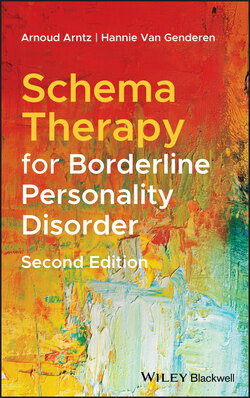Читать книгу Schema Therapy for Borderline Personality Disorder - Hannie van Genderen - Страница 25
The angry/impulsive child
ОглавлениеThe other child mode in BPD is that of the “angry/impulsive child.” The beginning of therapy is often overshadowed by desperation (Little Nora) and shame (punitive parent). Because of this, one does not often see the angry/impulsive child in the beginning of the therapy.
Angry Nora is a furious, frustrated, and impatient young child (approximately 4 years of age) who has no regard or consideration for others (See ST step by step 5.02). When in this mode, the patient is often verbally and, at times, physically aggressive and acrimonious toward others including her therapist. She is incensed that her needs are not met, and her rights go unacknowledged.
Angry Nora is convinced it is better to take all you can, or you will end up with nothing at all. She is convinced she will be taken advantage of. She is not only furious, but also wants everyone to see just how badly she has been treated. She does this by attacking others (verbally or physically), hurting herself, attempting to kill herself, or even others, as a form of revenge. This, of course, is the extreme form of Angry Nora. A milder way in which Angry Nora may show the therapist her anger is by not attending sessions or stopping therapy all together.
While the differences between the angry child and the angry protector are not always clear, they can usually be observed in how the anger is presented. The angry child is impulsive and unreasonable. She refers to issues that are completely unrelated and irrelevant. The angry protector is more controlled and more likely to be cynical than furious (see Chapter 9, “Treatment Methods for the angry/impulsive child,” for a sample dialogue).
When Little Nora also has an undisciplined/impulsive mode (see ST step by step 5.04 and 5.05) she might also feel out of control and frustrated. She feels that her needs have to be satisfied immediately and she cannot tolerate discomfort (pain or conflict). This side looks more like a spoiled child but is in fact also a deprived child. The therapist should keep in mind that this behavior is due to emotional and pedagogical deprivation. Little Nora has not learned how to cope with difficulties.
The most important characteristic of this mode is the impulsive way BPD patients try to get their needs met. The patient may, for instance, have sexual contacts with people she doesn't really know, in an attempt to get a feeling of being of value and cared for. Other examples are impulsive buying, impulsive alcohol or drug use, and impulsive eating (Table 2.1). Such behaviors are related to this mode when they are impulsive (the patient did not really contemplate the long‐term risks), often motivated by a sort of rebelliousness against the punitive mode and have the aim of need satisfaction. Alcohol and benzodiazepine use, especially in combination, might lead to a loss of (the already problematic) inhibition of these kinds of impulses. The general aim of the treatment is that patients learn to acknowledge their needs (instead of trying to detach from them) and develop healthier ways of getting their needs met.
The purpose of therapy is to teach the patient that she can be angry, but that there are other ways to express this emotion than the impulsive and extreme manner she currently adheres to.
Outbursts of rage are impulsive and unexpected. Should these take place during a session, the therapist should attempt to remain calm and tolerate the anger. He should only limit the display of anger when the patient threatens to damage persons or property, or when the expression of her anger is so humiliating that the therapist feels his limits are violated.
Table 2.1 Examples of impulsive behavior
| Spending too much money Run up debts | Shopping without a plan. Buy too many or too expensive things in order to comfort yourself |
| Impulsive, unprotected sex | Having impulsive sexual contact with someone who is nice to you, while in fact you are looking for attention and love |
| Quit your job suddenly | When you have a problem at work and you feel treated unfair, you immediately conclude that this is not the right job |
| Alcohol and drugs abuse | Using too much alcohol and drugs too much because you don't care about the consequences |
| Get pregnant without a plan | Wanting a child to have company |
